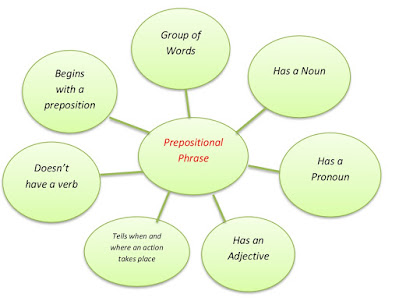Lesson Planning of Prepositional Phrases Subject English Grade 6th
Lesson Planning of Prepositional Phrases
Subject English
Grade 6th
Students’` Learning Outcomes
- Use some prepositional phrases.
Information for Teachers
- Read the following sentences:
- (i) (A) He is ill. (b) He still works.
- (ii) In spite of his illness, he works.
- (iii) (a) He made a promise. (b) He kept it also.
- (iv) Besides making a promise, he kept it.
- In sentence (ii) ‘in spite of’ and in sentence (IV) ‘besides making’ are groups of words beginning with a Prepositional Phrase and act as a unit other than a Noun Phrase, an Adjective Phrase or Adverb Phrase. Such Phrases are called Prepositional Phrases.
- Prepositional phrase is a group of words that begins with a preposition. It tells where or when an action takes place.
- Note: that the prepositional phrase contains no verbs. Generally, they contain a gerund. The noun or pronoun is the object of the preposition e.g. in the air, on the bus, against the wall, through the pipe.
- Note: Some Adjective Phrases and Adverbial Phrase also begin with a Preposition. But such an adjective Phrase qualifies a noun and such an Adverb Phrase modifies a verb, Adjective or another Adverb, while a purely Prepositional Phrase keeps its main force on Preposition construction. However, in a broader sense, Prepositional Phrases include Adjective Phrase beginning with a Preposition, Adverb Phrase beginning with a Preposition and a purely Prepositional Phrase with its main force on Preposition.
Material / Resources
Writing board, chalk/marker, duster, pointer,
textbook
Introduction
Brainstorming about the prepositions:
- Now draw the concept map on the board and explain it to the students. (see in information for teachers)
Development
Activity 1
- Recap the difference between a phrase and a sentence.
- Write the following sentence on the board and ask the students to pick out the prepositional phrases from them. (The prepositional phrases have been underlined for the help of teacher)
- The child saw a fairy in his dream.
- The students were in their bright uniforms.
- He writes the sentence on the board.
Activity 2
- Ask the students to find the meanings of the following phrases from the dictionary and then use any five of them in their sentences.
- On the wall, against the wall, above the wall, along the wall
- In the book, about the book, by the book, on the book
Conclusion / Sum up
- Conclude the lesson by summing up the concept of prepositional phrases.
- Ask students to construct sentences changing the preposition, while keeping the subject and object same. Discuss how the meaning has changed, as;
- The car was going under the bridge.
- The car was going near the bridge
- The car was going over the bridge
Assessment
- Ask the following questions from the class; as;
- What is a phrase?
- How is it different from a sentence?
- What is a prepositional phrase?
Follow up
- Ask the students to find out the meanings of the following prepositional phrases from the dictionary:
- Out of the box
- In for it
- On the run
- Out of the hand
Answer key of Follow up activity:
- To do something differently
- To be in favour of something
- To escape
- Hard to control



Comments
Post a Comment